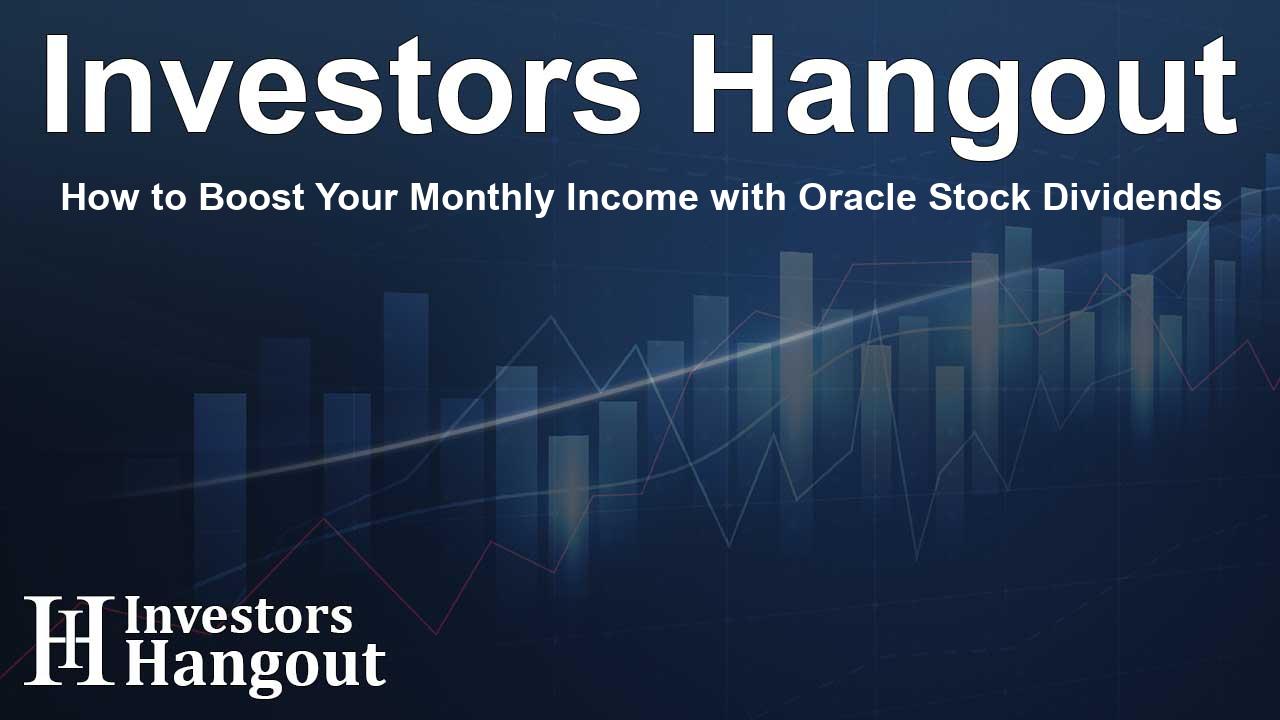How to Boost Your Monthly Income with Oracle Stock Dividends

Understanding Oracle's Financial Outlook
Oracle Corporation (NYSE: ORCL) is gearing up to announce its earnings results for the first quarter of fiscal year 2025. Investors are keenly awaiting this news, which is set to occur after the market closes one Monday evening.
Anticipated Earnings and Revenue
Analysts predict that Oracle will report earnings of $1.33 per share, reflecting a significant increase from the prior period's $1.19 per share. The company is expected to disclose revenue figures around $13.24 billion, showcasing its growth and resilience in the tech sector.
Recent Performance Highlights
In June, Oracle shared its fourth-quarter results, reporting revenues of $14.3 billion. This figure was lower than market expectations, which stood at $14.554 billion. Furthermore, adjusted earnings came in at $1.63 per share, slightly missing analysts' predictions of $1.65 per share.
Dividend Opportunities for Investors
Oracle is generating interest among investors not just for its earnings potential, but also for its dividend yield, which currently stands at 1.12%. This translates to a quarterly dividend of 40 cents per share, totaling $1.60 annually. With this in mind, how can investors leverage these dividends to create a sustainable income stream?
Calculating Your Potential Earnings from Dividends
To achieve a target income of $500 each month, or $6,000 yearly, investors would need to invest approximately $534,788, translating to around 3,750 shares. For those aiming for a more conservative $100 monthly income, the required investment drops to about $106,958, or 750 shares.
Understanding Dividend Yield Fluctuations
It's crucial to remember that dividend yields can fluctuate based on changes in both the dividend payment and the stock price. For instance, if a stock with an annual dividend of $2 is priced at $50, it equates to a 4% yield. However, if that price rises to $60, the yield decreases to approximately 3.33%. Conversely, if the price drops to $40, the yield rises to 5%.
How Market Variables Affect Your Investment
The relationship between dividend payments and stock prices can significantly impact your investment's yield. If the company increases its dividend while the stock price remains stable, the yield will increase. However, should the dividend decrease, the overall yield will also diminish.
Current Stock Performance
Recently, ORCL shares saw an uptick of 1.3%, closing at $142.61. This positive movement indicates strong investor confidence, particularly as the earnings announcement approaches.
Frequently Asked Questions
What is Oracle's current dividend yield?
As of now, Oracle offers an annual dividend yield of 1.12%, translating to a quarterly payment of 40 cents per share.
How can investors generate $500 a month from Oracle?
To earn $500 monthly from Oracle's dividends, an investment of approximately $534,788 or 3,750 shares is required.
What factors influence dividend yield?
Dividend yield can fluctuate based on the company’s dividend payment and the stock’s market price.
What was Oracle’s recent earnings performance?
Recently, Oracle reported fourth-quarter earnings, with revenues of $14.3 billion, falling short of estimates.
How does stock price affect dividend income?
Changes in stock price impact the yield; a rise in price can decrease yield, while a decrease in price can increase yield, assuming dividends stay the same.
About Investors Hangout
Investors Hangout is a leading online stock forum for financial discussion and learning, offering a wide range of free tools and resources. It draws in traders of all levels, who exchange market knowledge, investigate trading tactics, and keep an eye on industry developments in real time. Featuring financial articles, stock message boards, quotes, charts, company profiles, and live news updates. Through cooperative learning and a wealth of informational resources, it helps users from novices creating their first portfolios to experts honing their techniques. Join Investors Hangout today: https://investorshangout.com/
Disclaimer: The content of this article is solely for general informational purposes only; it does not represent legal, financial, or investment advice. Investors Hangout does not offer financial advice; the author is not a licensed financial advisor. Consult a qualified advisor before making any financial or investment decisions based on this article. The author's interpretation of publicly available data shapes the opinions presented here; as a result, they should not be taken as advice to purchase, sell, or hold any securities mentioned or any other investments. The author does not guarantee the accuracy, completeness, or timeliness of any material, providing it "as is." Information and market conditions may change; past performance is not indicative of future outcomes. If any of the material offered here is inaccurate, please contact us for corrections.